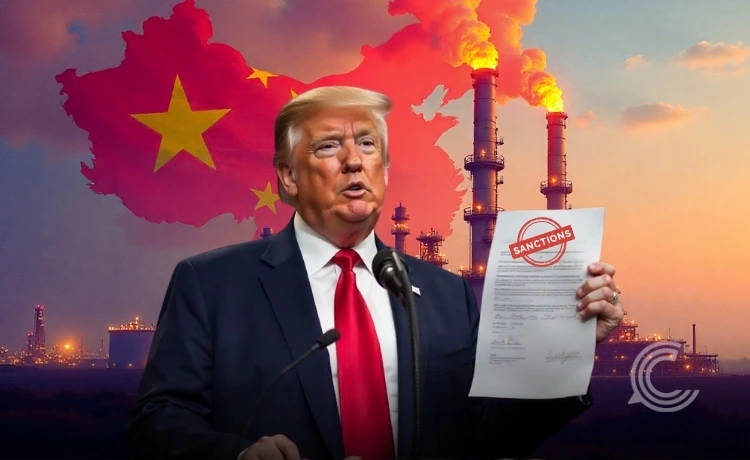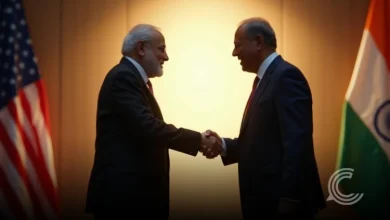US Sanctions China Refinery, Vessels Over Iran Oil Trade

Key Highlights-
- US hits 100+ entities, including a Chinese ‘teapot’ refinery, over illicit Iran oil purchases.
- China’s Rizhao terminal was sanctioned for accepting over a dozen Iranian ‘shadow fleet’ tankers.
- Economic pressure on Iran escalates despite the US expressing optimism on Gaza ceasefire support.
The United States has ramped up its economic offensive against Tehran, announcing a new, sweeping round of Iran Oil Sanctions that directly target companies and infrastructure in China, accused of facilitating billions in illicit petroleum trade. The action, announced by Trump on Thursday, saw sanctions imposed on roughly 100 individuals, entities, and vessels, including a prominent Chinese independent refinery and an oil terminal.
The Treasury Department confirmed that its Office of Foreign Assets Control (OFAC) designated the Shandong Jincheng Petrochemical Group, an independent “teapot” refinery situated in Shandong Province. According to the Treasury, this single firm has been responsible for purchasing millions of barrels of Iranian oil since 2023, providing a critical financial lifeline to the regime in Tehran.
Also Read | China Tightens Rare Earth Export Curbs Over Military and Chip Tech
These sanctions are the fourth major round specifically targeting China-based refiners that continue to flout international restrictions.
Dismantling Iran’s “Energy Export Machine”
The U.S. government maintains that revenue generated through Iran’s oil and petrochemical exports directly funds Tehran’s nuclear and missile programs, alongside supporting various militant proxies throughout the Middle East. While Iran officially maintains that its nuclear ambitions are purely for peaceful purposes, the American administration views these illicit sales as a grave national security threat.
“The Treasury Department is degrading Iran’s cash flow by dismantling key elements of Iran’s energy export machine,” said Treasury Secretary Scott Bessent, emphasizing the goal of crippling Tehran’s financing mechanisms. The crackdown is a cornerstone of the administration’s “maximum pressure” campaign designed to drive Iran’s oil exports to zero.
Exposing China’s Shadow Fleet Operations
Central to the sanctions announcement was the exposure of the operational network used to bypass international scrutiny. The Treasury Department specifically sanctioned the Rizhao Shihua Crude Oil Terminal in China, which operates a key terminal at Lanshan port.
Furthermore, the Treasury revealed that this terminal has accepted more than a dozen vessels belonging to Iran’s so-called “shadow fleet”, employing deceptive techniques like turning off tracking beacons and falsifying cargo manifests to evade sanctions.
Tehran’s Resilience and China’s Fierce Opposition
Despite years of intense U.S. pressure, Iran’s oil export engine has proven remarkably resilient. According to data tracked by the non-profit group United Against a Nuclear Iran, the country’s oil exports in September reached a new high for the year, totalling an estimated 63.2 million barrels worth approximately $4.26 billion.
Additionally, this sales surge was likely driven by international buyers stockpiling ahead of the expected resumption of U.N. sanctions on Iran, the group noted. Indicating a consistent global demand for discounted Iranian crude despite the risks.
Timing and the Gaza Ceasefire
The announcement of the extensive Iran Oil Sanctions is notably timed against the backdrop of broader Middle East diplomacy. The sanctions were released even as the administration confirmed progress on the Israel-Hamas ceasefire and hostage deal.
During a Cabinet meeting following the sanctions announcement, President Trump commented on Iran’s role, stating that Tehran had informed the administration it was in favor of the deal. Expressing cautious optimism, Trump stated that the US would work with Tehran. “We’d like to see them be able to rebuild their country too, but they can’t have a nuclear weapon,” Trump said, hinting at future diplomatic possibilities, yet simultaneously maintaining a hardline stance on nuclear proliferation.
The immediate effect of this maximum pressure approach will be felt most acutely by the targeted Chinese firms, specifically the “teapot” refineries, who must now weigh the deeply discounted price of Iranian oil against the sudden risk of losing access to the international financial system.



